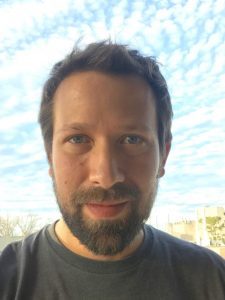UNC Lineberger presented three postdoctoral fellows with the Joseph S. Pagano Award to recognize their leadership of notable scientific publications.
Kirsten Bryant, PhD, Ari Pani, PhD, and John Pryor, PhD, were selected through a competitive process for the honor, which comes with a $2,500 award. The three recipients will be formally recognized in a ceremony Sept. 4.

The Pagano Awards are named for Joseph Pagano, MD, UNC Lineberger director emeritus and Lineberger Professor of Cancer Research. Pagano was the founding director of the cancer center and its postdoctoral training program. Funded by a gift from the Burroughs Wellcome Fund, the awards were established in 2002 to recognize noteworthy papers authored by UNC Lineberger’s postdoctoral fellows and published in high-impact journals.
“These awards recognize the hard work of our postdoctoral researchers, who are leading important science to try to beat the deadliest cancers and help solve complex scientific problems,” said UNC Lineberger’s Brian Strahl, PhD, professor in the UNC School of Medicine Department of Biochemistry and Biophysics, who chaired the award committee.

Bryant, who is now a research assistant professor in the UNC School of Medicine, was recognized for her work on a study published in Nature Medicine. She helped lead the study while working as a postdoctoral fellow in the lab of UNC Lineberger’s Channing Der, PhD, the Sarah Graham Kenan Distinguished Professor in the UNC School of Medicine Department of Pharmacology.
The paper detailed findings for a possible new therapeutic strategy for pancreatic cancer that involves blocking the cancer cells’ energy source.
In his nomination letter, Der said Bryant not only authored the study and performed the majority of experiments, she also came up with the idea. The study represented a shift for Der’s lab toward targeting cellular metabolism as a therapeutic strategy. Her work led to planning for multiple clinical trials.
“In summary, to say that Bryant et al is a ‘notable’ publication is a vast understatement,” Der said. “That Kirsten’s findings may redefine the treatment for pancreatic cancer, the only cancer with a single digit five-year survival rate, may represent one of the most significant findings in pancreatic cancer treatment in decades,” he said.

Pani was the “driving force” behind a paper published in the journal eLife in which he used fluorescent tags to show the signaling protein Wnt interacting with its receptor in C. elegans, an organism often used to study genetics.
UNC Lineberger’s Bob Goldstein, PhD, James L. Peacock III Distinguished Professor in the UNC-Chapel Hill Department of Biology, said Pani was also able to improve tools used to edit the organism’s genome. He has since secured a tenure-track faculty position at the University of Virginia, where he will start his own lab in the fall, Goldstein said.
“He began his postdoc by learning to use C. elegans as a model system and then learning and indeed improving CRISPR-based methods for editing the C. elegans genome – improving methods that were only just then being developed (for C. elegans) by one of his lab mates and by others in the field as he arrived in my lab,” Goldstein said.
John Pryor, PhD, was honored for his work on the paper, “Ribonucleotide incorporate enables repair of chromosome breaks by non-homologous end-joining,” as part of the lab of UNC Lineberger’s Dale Ramsden, PhD, a professor in the UNC School of Medicine Department of Biochemistry & Biophysics.

The paper, published in Science, uncovered a finding that is an exception to a tenant of the central dogma of biology. The study found that ribonucleotides, the building blocks of RNA, are frequently added into the human genome during a specific DNA repair process. The finding represented a significant shift away from the foundational principle that our genetic code is written as DNA, while RNA is the language of proteins.

In his nomination letter, Ramsden said Pryor initiated the project, and the paper that resulted from the study was one of the most important papers to come out of his lab. The work could provide a way that researchers could sensitize cancer cells to radiation. Ramsden also complimented Pryor for his overall performance.
“All in all, John was quite the bargain – he had external grant support for all six of the years he was in my lab, during which he made major contributions to eight publications,” Ramsden said. “There is a long list of awards that he’s won, including best PhD thesis as a pre-doc, and the top oral presentation prize at the Cancer Biology Training Consortium meeting as a postdoc.”
Courtesy of Laura Oleniacz, Science Communication Manager at Lineberger
